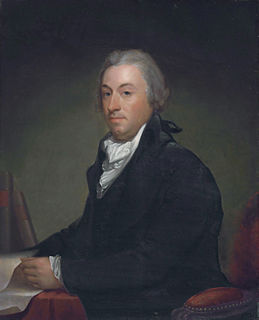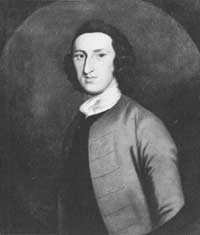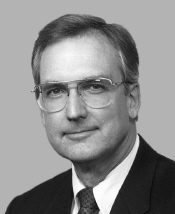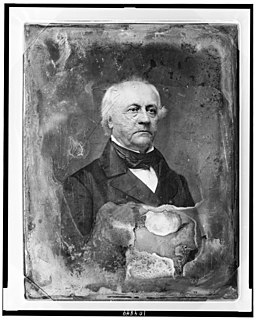
Robert Robert Livingston was an American lawyer, politician, diplomat from New York, and a Founding Father of the United States. He was known as "The Chancellor", after the high New York state legal office he held for 25 years. He was a member of the Committee of Five that drafted the Declaration of Independence, along with Thomas Jefferson, Benjamin Franklin, John Adams, and Roger Sherman. Livingston administered the Oath of Office to George Washington when he assumed the presidency in 1789.

William Livingston was an American politician who served as the Governor of New Jersey (1776–1790) during the American Revolutionary War and was a signer of the United States Constitution.

Philip Livingston was an American merchant and statesman from New York City. He was a delegate for New York to the Continental Congress from 1775 to 1778, and signed the Declaration of Independence.

Robert Linlithgow Livingston Jr. is an American lobbyist and politician who served as a U.S. Representative from Louisiana from 1977 to 1999. A Republican, he was chosen as Newt Gingrich's successor as Speaker of the U.S. House of Representatives, a position he declined following revelations of an extramarital affair. He served as a U.S. Representative from Louisiana from 1977 to 1999 and as the Chairman of the Appropriations Committee from 1995–1999. During his final years in congress, Livingston was a strong supporter of Bill Clinton's impeachment. He is currently a Washington, D.C.-based lobbyist. Livingston's memoir, The Windmill Chaser: Triumphs and Less in American Politics, was published in September 2018.

John Watts Jr. was an American lawyer and politician from New York City who represented New York in the U.S. House of Representatives.

William Alexander Duer was an American lawyer, jurist, and educator from New York City. He was a president of Columbia University, then called Columbia College.

Aaron Ogden was an American soldier, lawyer, United States Senator and the fifth Governor of New Jersey. Ogden is perhaps best known today as the defendant in Gibbons v. Ogden which destroyed the monopoly power of steamboats on the Hudson River in 1824.

William Durkee Williamson was the second Governor of the U.S. state of Maine, and one of the first congressmen from Maine in the United States House of Representatives. He was a member of the Democratic-Republican Party. Williamson was also an early historian of Maine.
Peter Robert Livingston was an American politician who served as Acting Lieutenant Governor of New York from February to October 1828.

Philo Case Fuller was an American lawyer and politician.
James Livingston born in New York, was living in Quebec when the American Revolutionary War broke out. He was responsible for raising and leading the 1st Canadian Regiment of the Continental Army during the invasion of Canada, and continued to serve in the war until 1781. He retired to Saratoga, New York, where he served as a state legislator and raised a family of five children.
Jacob Rutsen Van Rensselaer was an American lawyer and Federalist politician who served as Speaker of the New York State Assembly from 1812 to 1813, and Secretary of State of New York, from 1813 to 1815.
Livingston is a surname with several different origins. The name itself originates in Scotland as a habitational name derived from Livingston in Lothian which was originally named in Middle English Levingston. This place name was originally named after a man named Levin who appears in several 12th century charters. In Ireland, the name was adopted by people bearing the Gaelic surnames Ó Duinnshléibhe and Mac Duinnshléibhe. Livingston can also be an Americanized form of Lowenstein, a Jewish surname.

Henry Brockholst Livingston was an American Revolutionary War officer, a justice of the New York Court of Appeals and eventually an Associate Justice of the Supreme Court of the United States.

John Ten Eyck Lansing Jr. was an American lawyer and politician.

Lewis Cass Ledyard was a New York City lawyer, a name partner at the firm Carter Ledyard & Milburn, personal counsel to J.P. Morgan, and a president of the New York City Bar Association.
John Henry Livingston was an American lawyer, proprietor of Clermont Manor, and prominent member of the Livingston family of New York.
This page is based on this
Wikipedia article Text is available under the
CC BY-SA 4.0 license; additional terms may apply.
Images, videos and audio are available under their respective licenses.













